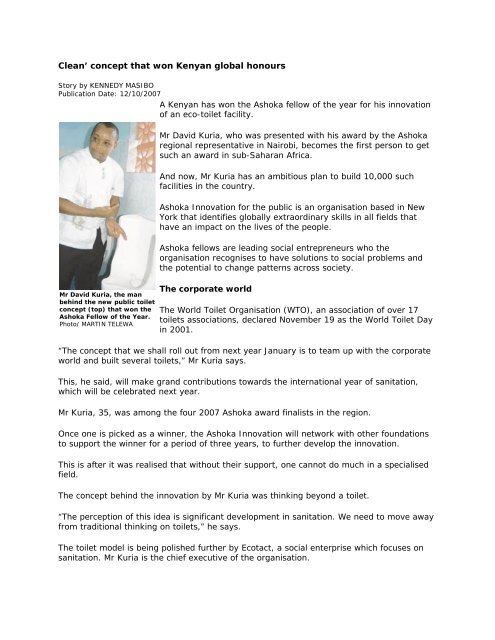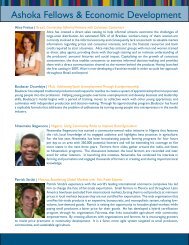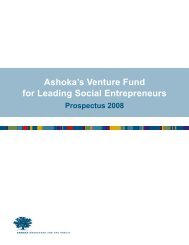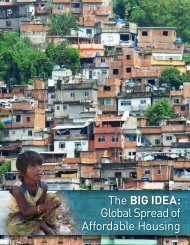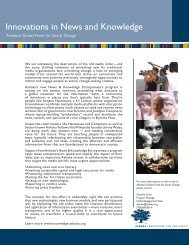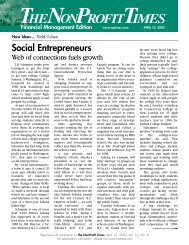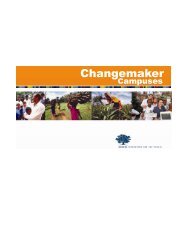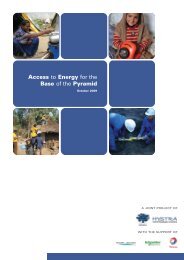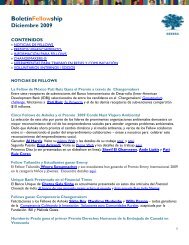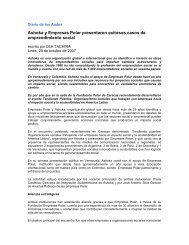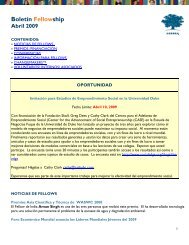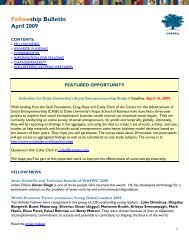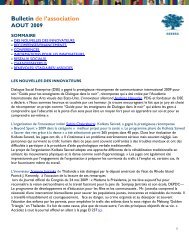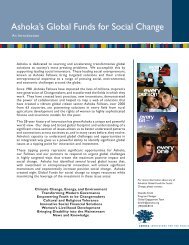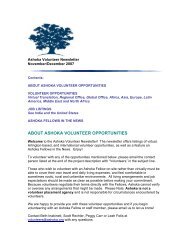Read more - Ashoka
Read more - Ashoka
Read more - Ashoka
You also want an ePaper? Increase the reach of your titles
YUMPU automatically turns print PDFs into web optimized ePapers that Google loves.
Clean’ concept that won Kenyan global honours<br />
Story by KENNEDY MASIBO<br />
Publication Date: 12/10/2007<br />
A Kenyan has won the <strong>Ashoka</strong> fellow of the year for his innovation<br />
of an eco-toilet facility.<br />
Mr David Kuria, the man<br />
behind the new public toilet<br />
concept (top) that won the<br />
<strong>Ashoka</strong> Fellow of the Year.<br />
Photo/ MARTIN TELEWA<br />
Mr David Kuria, who was presented with his award by the <strong>Ashoka</strong><br />
regional representative in Nairobi, becomes the first person to get<br />
such an award in sub-Saharan Africa.<br />
And now, Mr Kuria has an ambitious plan to build 10,000 such<br />
facilities in the country.<br />
<strong>Ashoka</strong> Innovation for the public is an organisation based in New<br />
York that identifies globally extraordinary skills in all fields that<br />
have an impact on the lives of the people.<br />
<strong>Ashoka</strong> fellows are leading social entrepreneurs who the<br />
organisation recognises to have solutions to social problems and<br />
the potential to change patterns across society.<br />
The corporate world<br />
The World Toilet Organisation (WTO), an association of over 17<br />
toilets associations, declared November 19 as the World Toilet Day<br />
in 2001.<br />
“The concept that we shall roll out from next year January is to team up with the corporate<br />
world and built several toilets,” Mr Kuria says.<br />
This, he said, will make grand contributions towards the international year of sanitation,<br />
which will be celebrated next year.<br />
Mr Kuria, 35, was among the four 2007 <strong>Ashoka</strong> award finalists in the region.<br />
Once one is picked as a winner, the <strong>Ashoka</strong> Innovation will network with other foundations<br />
to support the winner for a period of three years, to further develop the innovation.<br />
This is after it was realised that without their support, one cannot do much in a specialised<br />
field.<br />
The concept behind the innovation by Mr Kuria was thinking beyond a toilet.<br />
“The perception of this idea is significant development in sanitation. We need to move away<br />
from traditional thinking on toilets,” he says.<br />
The toilet model is being polished further by Ecotact, a social enterprise which focuses on<br />
sanitation. Mr Kuria is the chief executive of the organisation.
He cites an example where traditionally, a toilet is constructed away from the main house<br />
and rarely talked about.<br />
Three billion people<br />
Mr Kuria says that according to the UN, three billion people in the world lack standard<br />
sanitation.<br />
“Some of them relieve themselves in open places, including the flying toilets, so there is a<br />
linkage between sanitation and public health,” he points out.<br />
He further says that about 6,000 children die daily because of sanitation related diseases,<br />
most of them under five years.<br />
Most of the public toilets, he says, are dirty and rarely do people invest in them.<br />
Mr Kuria says the concept is to make it as an enterprise, where there is shoe shine, a candy<br />
shop, a calling booth and snacks, among other things. A shower goes at Sh20, toilet service<br />
Sh5 and change service at Sh5.<br />
One such toilet was this year unveiled in Nakuru Town.<br />
Local Government minister Musikari Kombo opened the facility, which is located at the<br />
Nyayo Gardens.<br />
The Sh1.5 million toilets, built on the concept of ecological sanitation, have a facility for rain<br />
water harvesting, which is used for regular cleaning.<br />
The concept revolves around the principle of conservation and recycling of material flushed<br />
out of the sewer network.<br />
There are also waterless urinals in an attempt to conserve the commodity. Flush urinals are<br />
discouraged because they can consume up to 600 litres of water daily for four units.<br />
According to Mr Kuria, using waterless units, the facility could save an estimated 450,000<br />
cubic of water yearly.<br />
By using such urinals, urine is easily collected and the urea extracted for use in organic<br />
manure composting. The end product is used as organic fertiliser.<br />
Mr Kuria says the waterless urinal helps to reduce the consumption of water, particularly in<br />
sub Saharan cities where the commodity is scarce.<br />
“In the urinals, blue seal denser is inserted and which constantly absorbs the foul smell and<br />
harvests the urine,” he says.<br />
Mr Kuria observes that although the initial cost of setting such urinals could be high, in the<br />
long run, they help save water.<br />
He says that most sub Saharan Africa cities do not have adequate water, and when such a
facility is put in place, it cuts overdependence on water.<br />
He challenges hotels and other social places to take up the initiative and save the bill on<br />
water.<br />
The only way to reduce the water consumption, he notes, is to set up waterless urinals,<br />
which is an innovation modelled from Mexico. Harvesting of rain water is also done at the<br />
facility by installing a 10,000-litre tank.<br />
Mr Kuria says that most of the soils have been depleted because of poor farming methods,<br />
and points out that the human urine contains very rich nitrate and phosphorous that can be<br />
used to manufacture fertilisers to enrich soils.<br />
Mr Kuria says methane gas can be produced with the digestion of human waste, which can<br />
be used as biogas for cooking.<br />
The facility, he points out, also creates employment since about four-to-five people are<br />
employed.<br />
Mr Kuria, who holds a BSc degree in architecture from the University of Nairobi is currently<br />
pursuing a Master’s degree in environmental management.<br />
He worked briefly in the Planning Department of the City Council of Nairobi before he joined<br />
the Intermediate Technology Development Group, where he has been for the last seven<br />
years.


